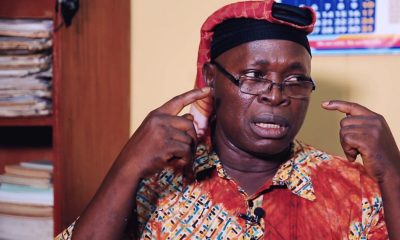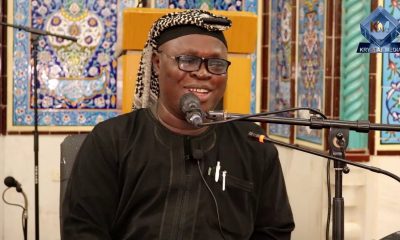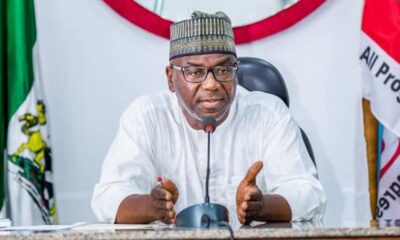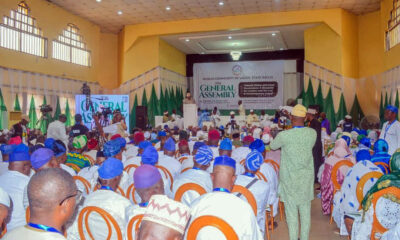metro
Christian Private Universities Subject Muslims To Forceful Conversion – MURIC
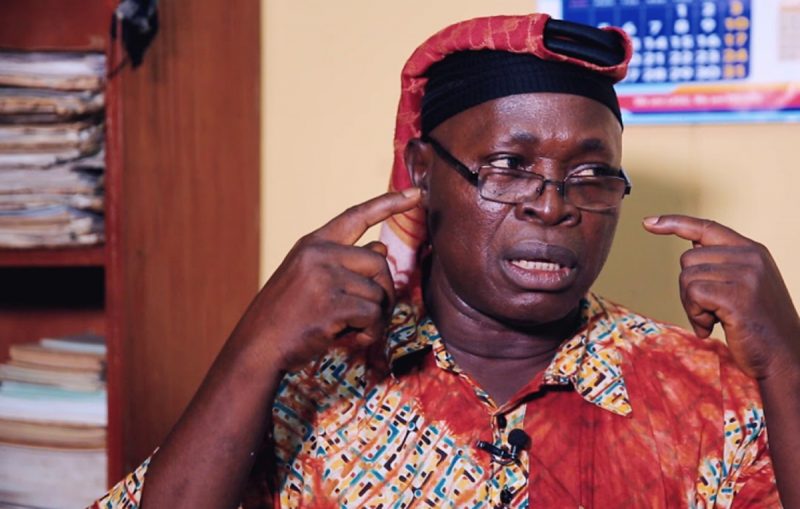
A call has gone to the Nigerian Universities Commission (NUC) to take necessary steps capable of stopping the oppression of Muslim students in Christian-owned private universities.
The call was made by the Muslim Rights Concern (MURIC).
The group alleged that Christian proprietors of private universities have consistently subjected Muslim students to forceful conversion via compulsory attendance of church services and denial of personal identity by disallowing use of hijab.
metro
Mob Kills Injured Motorcycle Rider After AK‑47 Rifles, Ammunition Found in Crash Scene

Mob Kills Injured Motorcycle Rider After AK‑47 Rifles, Ammunition Found in Crash Scene
A motorcycle accident in Niger State turned deadly when an injured rider was beaten to death by a mob after a sack recovered from the crash scene was found to contain three AK‑47 rifles, six magazines, and 104 rounds of ammunition, police have confirmed. The incident occurred on Tuesday, February 17, 2026, along the Boyi‑Sarki/Toll Gate area in Suleja, as the riders travelled from Tafa in Kaduna State towards Abuja.
According to the Niger State Police Command, two men on a motorcycle collided with a road construction/diversion barrier in a lone accident. One rider died instantly from injuries sustained in the crash, while the second, who was injured, was lynched by a crowd that had gathered under the guise of helping. Both corpses were later taken to the General Hospital morgue in Suleja.
READ ALSO:
- Tacha Condemns False Rape Allegations After Mirabel Admits Fabrication
- UK Court Hands Life Sentence to Nigerian Teen for Knife Attack Killing
- Ogun Gov Rewards Nigeria’s Best Primary School Teacher with Car, Bungalow
Police confirmed that a sack belonging to the victims contained three AK‑47 rifles, six magazines, and 104 rounds of live ammunition, raising concerns about illegal firearms trafficking and potential criminal activity along the busy Kaduna‑Abuja corridor.
The Commissioner of Police, CP Adamu Abdullahi Elleman, condemned the act of jungle justice, stating that the injured rider could have assisted police in tracing the source of the weapons and exposing criminal networks. CP Elleman directed the Area Commander in Suleja to conduct a thorough investigation and arrest the perpetrators. The recovered rifles are currently undergoing ballistic analysis for further investigation.
The Niger State Police Command emphasised that mob justice endangers lives, obstructs investigations, and undermines the rule of law. Authorities called on citizens to report crimes and suspicious activities to law enforcement rather than resorting to violence.
Security analysts warn that incidents like this highlight broader challenges in parts of northern Nigeria, including illegal arms proliferation, mob violence, and the risks of self-help justice. Communities are urged to cooperate with law enforcement to ensure public safety and accountability.
Mob Kills Injured Motorcycle Rider After AK‑47 Rifles, Ammunition Found in Crash Scene
metro
Police Bust Gang Armoury, Arrest Two Suspects in Delta

Police Bust Gang Armoury, Arrest Two Suspects in Delta
The Delta State Police Command has made a major breakthrough in its fight against armed gangs and violent crime by arresting two suspected armed robbers and uncovering a gang armoury containing locally fabricated firearms and ammunition.
According to the Command, the operation reflects a renewed commitment to dismantle criminal networks, recover illegal weapons, and ensure public safety. Commissioner of Police Aina Adesola stated that the Command “remains resolute in dismantling criminal networks, mopping up illegal firearms, and ensuring that perpetrators of violent crimes are brought to justice.”
The raid followed intelligence-led investigations that led operatives of the Special Assignment Team (CP‑SAT), under ASP Julius Robinson, to a suspected criminal hideout along the Sapele–Warri Road near Adeje Community in the early hours of February 19, 2026. The operation was linked to the interrogation of 25-year-old Dafiaga Timothy from Effurun, allegedly associated with a gang terrorising commuters along the Warri–Sapele axis.
READ ALSO:
- Peter Obi Launches ‘Village Boys Movement’ to Rival Tinubu’s City Boys Ahead of 2027
- Woman Dies in Bandits’ Camp After Family Pays ₦25 Million Ransom
- Reno Omokri Alleges El-Rufai, Sons Linked to Dadiyata’s Disappearance
Police recovered a locally fabricated long gun, a cut-to-size firearm, and a Beretta-style pistol loaded with five rounds of live ammunition, along with ten additional cartridges and a dagger. The Command described the seizure as a major disruption to the operational capability of the gang, while investigations continue to identify other suspects and trace the source of the arsenal.
In a related operation on February 18, 2026, officers from the Area Command in Warri intercepted a tricycle along the Agbarho/Warri Expressway. Two occupants fled, but the driver, Aliyu Sabo, 25, was arrested. A search uncovered a locally fabricated pistol, one live cartridge, one expended cartridge, and several other items, including mobile devices and a bag suspected to be linked to criminal activity. Sabo remains in custody as police work to apprehend his accomplices.
The Delta State Police emphasized that these operations form part of a broader campaign to curb violent crime, illegal firearms proliferation, and gang-related activities across the state. Authorities have urged residents to remain security-conscious and report credible information that could aid ongoing investigations.
The discovery is expected to have a significant impact on reducing armed robberies and cult-related violence, particularly along high-risk corridors such as Sapele–Warri Road and Agbarho/Warri Expressway, which have long been affected by criminal syndicates.
Police Bust Gang Armoury, Arrest Two Suspects in Delta
metro
Woman Dies in Bandits’ Camp After Family Pays ₦25 Million Ransom

Woman Dies in Bandits’ Camp After Family Pays ₦25 Million Ransom
The family of seven abducted residents in Erinmope-Ekiti, Moba Local Government Area, Ekiti State, is mourning the death of one of the victims, identified as Hawau Suleiman, who reportedly died in captivity, even after her family paid a ₦25 million ransom for the release of the hostages. Six other abductees were freed following the payment, but the deceased’s remains have not yet been recovered.
The victims were initially kidnapped on January 24, 2026, when armed gunmen stormed the community, abducting five women, including a nursing mother and a pregnant woman. The kidnappers initially demanded a ₦100 million ransom for their release.
Family members first raised ₦10 million and sent two relatives to deliver the money, but the kidnappers rejected the amount and detained the emissaries, increasing the number of captives to seven. After further negotiations, a total of ₦25 million was paid, resulting in the release of six abductees.
One of the freed victims, Muhammad Soliu, who had also been detained as part of the ransom negotiation, recounted the harrowing conditions in captivity. He said the abductees were tied together like goats and forced to trek several kilometres barefoot through dense forests spanning Ekiti, Kwara, and Kogi states.
READ ALSO:
- Reno Omokri Alleges El-Rufai, Sons Linked to Dadiyata’s Disappearance
- UK-Based Nigerian Gets 13-Year Jail Term for Forcing Girlfriend to Abort Pregnancy
- Lawmaker Jailed for Mocking President in Facebook Post
Soliu revealed that the deceased, Hawau Suleiman, became too weak to continue the trek and collapsed. “She was exhausted from the long distance we were made to walk. We pleaded with them to allow us carry her, but they threatened to kill us if we stopped. They ordered us to keep moving without looking back. It was the worst experience of my life,” he said.
He added that the pregnant woman among the captives was taken to an undisclosed hospital for medical attention, while locating Suleiman’s remains would be difficult due to the depth and density of the forest where she reportedly died.
Sunday Abutu, the Police Public Relations Officer in Ekiti State, said the command would investigate the incident and provide further details, but no official updates have yet been released regarding the recovery of the deceased.
The ordeal highlights the growing kidnapping crisis in Ekiti and southwestern Nigeria, where families are often forced to pay large ransoms under threats of violence, and victims face life-threatening conditions in captivity. Security analysts continue to warn that ransom payments, while sometimes saving lives, may embolden criminal gangs and perpetuate the cycle of banditry and insecurity.
Woman Dies in Bandits’ Camp After Family Pays ₦25 Million Ransom
-

 metro3 days ago
metro3 days agoLagos Woman Shares Ordeal After Alleged Rape, Sparks Nationwide Outcry
-

 News3 days ago
News3 days agoRamadan Begins in Nigeria as Sultan Confirms Crescent Sighting
-

 International1 day ago
International1 day agoCanada Opens New Express Entry Draw for Nigerian Workers, Others
-

 metro3 days ago
metro3 days agoSeven Killed in Horrific Crash at Ota Toll Gate
-

 News2 days ago
News2 days agoKorope Drivers Shut Down Lekki–Epe Expressway Over Lagos Ban (Video)
-

 Health2 days ago
Health2 days agoRamadan Health Tips: Six Ways to Stay Hydrated While Fasting
-

 News9 hours ago
News9 hours agoPolice to Arrest TikToker Mirabel After She Recants False Rape Claim
-

 metro1 day ago
metro1 day agoOsun Awards 55.6km Iwo–Osogbo–Ibadan Road Project to Three Contractors





